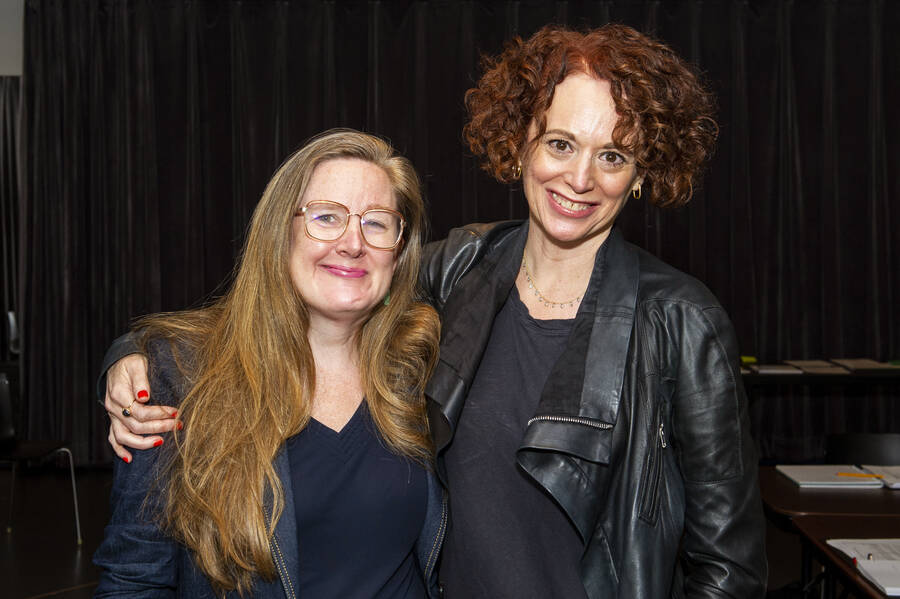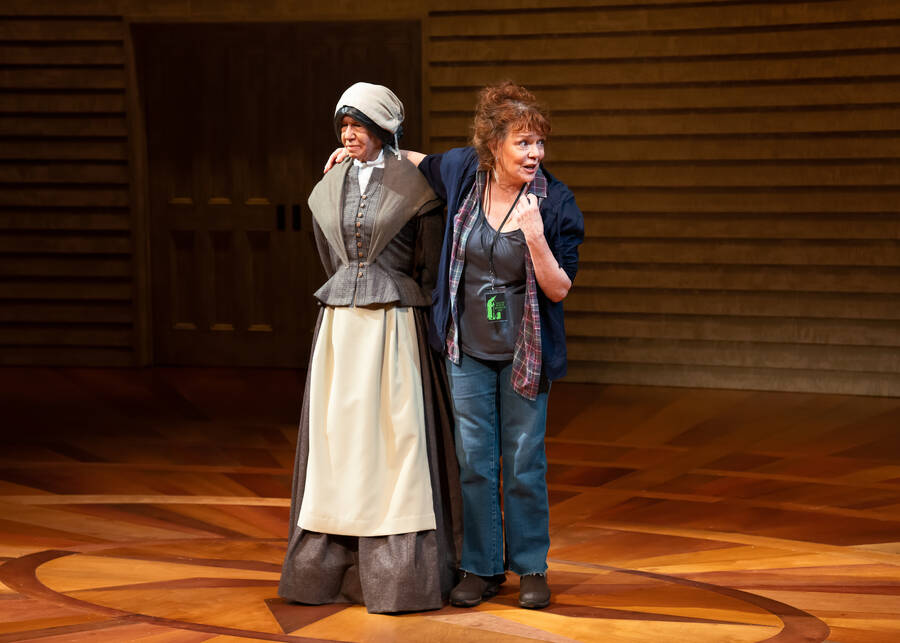This is not the first time Sarah Ruhl and Rebecca Taichman have made magic together. The powerhouse playwright-and-director duo have collaborated over the years on Orlando, The Clean House, and most recently the 2017 production of How to Transcend a Happy Marriage at Lincoln Center Theater, starring Marisa Tomei. They’re now back at 65th Street with Becky Nurse of Salem, a new tragicomedy, now in previews and opening on Dec. 4 at the Mitzi E. Newhouse Theater.
The play follows Becky Nurse, a living descendant of the real-life Rebecca Nurse, who at 71 was the oldest woman hanged for alleged witchcraft during the infamous Salem witch trials of 1692 (she was fully exonerated less than 20 years later). Prior to her execution, Rebecca had been a well-respected, faith-fueled member of her community. The same cannot be said of Ruhl’s present-day Becky, who loses her job at a witch museum in Salem, pines over a bartender named Bob, and tries to cull redemption from a lethal mixture of opioids and spells.
Becky Nurse of Salem meditates on contradictions—misogyny versus feminism, addiction versus release, Trump rally-bred “lock her up” or “send her back” chants spewed at female politicians like Hillary Clinton and Ilhan Omar, versus an exploding #MeToo survivor justice movement—while carrying a uniform spirit of hope.

“Over the past couple of years I’ve actually seen the reclamation of the word ‘witch,’” Ruhl told me. “And there are so many different kinds of witchcraft people practice, even healing forms.”
The day after the most recent midterm elections, in a political year tainted by the Supreme Court’s overturning of Roe v. Wade, I gathered with Ruhl and Taichman (and, I believe, the spirits of the Nurse women) to discuss early inspirations for the play, similarities between Salem and social media, and the perceived danger of powerful women.
BRITTANI SAMUEL: You have collaborated a number of times over the course of your careers. What keeps you coming back to each other?
SARAH RUHL: I first saw Rebecca’s production of The Clean House at Woolly Mammoth Theatre Company in 2005 and was astonished by how she balanced comedy with depth, and with a really precise and beautiful visual. I think Rebecca cares about beauty and romance in a way the contemporary world seems to not be so interested in those things. She’s done a ton of Shakespearean plays, which has honed her skills of emphasizing language and metaphor, not only realism.
REBECCA TAICHMAN: There’s so much to love about Sarah’s writing. She creates extraordinary tests and delights for any director, because her plays encompass mythic worlds and demand wildly theatrical elements. She asks huge existential questions while also telling profoundly rooted, funny, human stories. Sarah’s a poet, you know, so the challenge to physically represent the world of a poet is an exceptional gift.
Rebecca, can you walk me through how Sarah shares a script with you?
REBECCA: I feel like you’re very patient. You want to know what’s happening before you share it. Then the emails start to arrive.
SARAH: Yeah, I definitely wait for a beat. Then, when I know what the thing is, I’m maniacally sending draft after draft.
Zooming out a bit, Becky Nurse is a meditation on how so often the fate of women is not in our hands. Why use witches to relay this message?
SARAH: I saw Ivo van Hove’s production of The Crucible on Broadway in 2016. A few months later, Trump was elected president, and I saw his huge campaign crowds chant “lock her up” about his opponent at the time, Hillary Clinton. Both of these experiences were dancing around my mind with a kind of mystery and repulsion. I wanted to look at Salem and the infamous witch trials from a contemporary point of view, and from an older woman’s perspective, because that was so left out of The Crucible. It’s touched on, but truly, that play is John Proctor’s story. That was psychic background for me—the intense culture of misogyny in 2016 America. And I suppose, rage.
When you’re reframing such a storied historical event, how much are you leaning into recorded truth? How much creative liberty do you allow yourself?
SARAH: Research is the groundwork, for sure, but not the direction, if that makes sense. I could study the Salem witch trials all my life and never write the play. In fact, the reason that Salem is so resonant with modern thinkers is because the executions of those witches, or rather accused witches, was so well documented! Eventually, though, you have to leave the research behind and let the characters speak. And when Becky Nurse started talking to me, she wouldn’t shut up.
This is a major return to New York theatre audiences after years when most theatres were dark. What is the dominant emotion running around in your mind, body, heart? I know it’s the only second preview, so it’s a slightly inane time to ask this question.
REBECCA: It’s certainly moving to be in a room sharing a story again and to be a part of a collective group. It’s vulnerable and powerful and exciting—we have all been reminded of one, how fragile, and two, how extraordinary an opportunity it is to make theatre. It was painful to have that stripped away over the past few years, but funnily enough, stepping back into work for the first time, I also think I forgot how hard it was. I had a patina of ease; my memory held on to how beautiful and whimsical and essential theatre is, not how rigorous the process of making it is.
SARAH: I think there is some fear of judgment in New York City in particular, but a lot of joy outweighing that. My favorite part is still the experience of a rehearsal room—watching actors reinvent themselves and laughing at their amazing choices. Rebecca and I had dinner before our first audience last night and I was not nervous, just excited to hear what an audience was going to bring to the work.
REBECCA: Same; I wasn’t nervous. [Laughs] After a couple drinks.
SARAH: Those helped.
What did that first audience teach you all about the story you are telling here?
REBECCA: Oh, they were riveted by it, I really think they were. Sometimes the entire preview process feels like a maximum learning opportunity. There’s no going back at that point; you will always know what it feels like to have an audience. The volume of learning on that first performance night is massive. I’m still sifting through and trying to metabolize what their laughter or gasps revealed; I don’t want to snap too quickly and overreact.
SARAH: That reframing is helpful, because you are learning from what you share, as opposed to just offering a thing to be judged. We get too much of that latter mindset, particularly in New York City.
The title role of this play is a lot to chew on for any actor. What makes Deirdre O’Connell Becky Nurse?
REBECCA: Didi is one of a kind. She has an extraordinary ability to be completely real and authentic in a moment, but also lend extreme style to what she’s doing. She’s sympathetic and complex and very, very, very funny.
SARAH: She’s truly magical.
That’s key for a show about witches.
SARAH: Exactly! And she’s been working steadily for years in downtown experimental New York theatre, but is now getting the widespread recognition that is long overdue. She is a true artist with a fine-tuned instrument—or brush, I should say, because she’s also a painter. Didi’s also from Worcester, Mass., so she completely knows the world the play lives in. Supposedly, comedienne Lucille Ball was a descendant of the real-life Rebecca Nurse, and I think there’s a little bit of Lucille floating around in Didi. She can be deeply serious, but she’s also got that clown in her.
This is a biggie, but how do you think stories about witches and witchcraft have impacted society’s views on women—especially powerful or outspoken ones?
SARAH: People genuinely believe there is a malignancy to a woman who has brave ambition for power; I mean, people are trying kill Nancy Pelosi, there were foiled plans to kidnap Gov. Gretchen Whitmer of Michigan, there are QAnon threads dedicated to a conspiracy that Hillary Clinton feeds on children’s blood. Is it really a far cry from deranged women flying in the air on broomsticks?
REBECCA: There’s a song we use in the show called “Season of the Witch,” and I keep meditating on that title. There’s a palpable fear of women, women of color, all people of color taking on more power right now. The massive reaction by the fearful is to cut off that progress at the knees. And to vilify it with a derogatory idea, like a demonic or witchlike force.
The more we talk, the more Salem sounds like Twitter. It’s easy to disparage a woman with no evidence of a crime or misbehavior.
SARAH: I’ve become infatuated with a phrase from Salem called spectral evidence, or evidence sourced from dreams. You could say a so-called witch visited you at night and sat on you in your sleep with an animal on her shoulder, just anything! And it was validated.
REBECCA: Could you imagine if you could still accuse somebody for an act conducted in a dream?
SARAH: Oh baby, people would be locked up.
REBECCA: But in a way we are still in that. Like you said, people conjure up fiction about other people all the time, and once it’s repeated enough, it somehow becomes real.
SARAH: There’s an infectious nature to the fallacies, like the epidemic people thought witchcraft was.
Dark comedies like Becky are enjoying a shining moment this year. Why do you think the genre is hitting American theatre’s sweet spot?
REBECCA: The need to laugh has become desperate. There’s something communal about laughing; it opens the spirit. Laughter allows you to engage with darkness in an innocent way. Your heart is responding before your head to all of those big ideas, questions, stories.
SARAH: I think, too, when you laugh about your circumstance, you can cope with it. In such dark times, laughter almost becomes philosophical. It’s a reminder of hope, and any kind of forward-moving activism or agency requires that reminder. A complete comedy that took no stock of the reality we’re dredged in would seem too fictional, but to go down the rabbit hole of despair is just dangerous. Is it insane to write a comedy where the underbelly is Salem witch trials and an opiate epidemic? Sure. And yet, that seems to be what I had to share.
Brittani Samuel (she/her) is a New York-based writer, critic, and co-editor of 3Views on Theater. Bylines can be found at Elle, Glamour, Observer, and more. She can be found at BrittaniSamuel.com or on Instagram at @brittaniidiannee.


